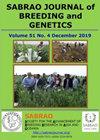MICROMORPHOLOGICAL AND ANATOMICAL RESPONSES OF NATIVE DICOTS TO INDUSTRIAL EFFLUENTS RELEASED FROM CONTAMINATED REGION OF THE CHENAB RIVER IN PAKISTAN
IF 1.6
Q3 PLANT SCIENCES
引用次数: 0
Abstract
Faisalabad industrial units discharge effluents and associated toxic chemicals into the environment, deteriorating ecological conditions and ecosystem health. Morphoanatomical changes in some medicinally important native species (Calotropis procera, Eclipta alba, Phyla nodiflora, and Ranunculus sceleratus) exposed to heavy industrial pollution gained evaluation. These species of choice were due to their widespread distribution in the area. Ten sites selected in the River Chenab, Chiniot, had three near point source pollution of Faisalabad industries within the 500-m radius (polluted) at three drains and two sites inside the river after each drain point source with the control site at 14 km after from the first industrial drain point source. The general response of all plants to effluents was growth retardation. Plant height increased significantly in all species from river sites. An increase in tallness was more prominent in species like C. procera and P. nodiflora. An increase in stem sclerification in C. procera and E. alba from polluted sites occurred, which indicated a better ability to tolerate industrial pollution. Remarkable increases in stem and leaf epidermis, intensive stem sclerenchyma, and closely packed stem vascular bundles in C. procera appeared, which could increase resistance to industrial pollution. Most of the morphoanatomical parameters notably attained a decrease in E. alba, the most vulnerable species. Plant survival depends on particular structural changes in dermal, mechanical, parenchymatous, and vascular tissues. Overall, industrial pollution adversely impacts plant morphological and micromorphological features, although the reaction of specific species to industrial contamination varies. The study determined that stem and leaf anatomical features, such as, epidermis size and storage tissue thickness, are suitable morphoanatomical markers for industrial pollution biomonitoring. Internal modifications of plants vegetating different industrial contaminated sites played a significant role in high tolerance levels.巴基斯坦奇纳布河污染区排放的工业废水对本地dicots的微观形态和解剖学反应
费萨拉巴德工业单位向环境排放污水和相关有毒化学品,使生态条件和生态系统健康恶化。对一些重要药用原生物种(Caltrophis procera、Eclipseta alba、Phyla nodiflora和Ranunculus sceleratus)在重工业污染中的形态解剖变化进行了评估。这些物种的选择是由于它们在该地区的广泛分布。在吉尼奥德Chenab河中选择的10个地点,在三个排水沟的500米半径范围内有三个费萨拉巴德工业的近点源污染(被污染),在每个排水点源后的河流内有两个地点,控制地点在第一个工业排水点源14公里后。所有植物对废水的一般反应都是生长迟缓。来自河流地区的所有物种的株高都显著增加。高大的增加在C.procera和P.nodiflora等物种中更为显著。来自污染地点的C.procera和E.alba茎的sclerification增加,这表明它们具有更好的耐受工业污染的能力。C.procera的茎叶表皮显著增加,茎厚壁组织密集,茎维管束紧密,可提高对工业污染的抵抗力。大多数形态解剖参数显著降低了最脆弱的物种白蜡猴的数量。植物的存活取决于真皮、机械组织、实质组织和血管组织的特殊结构变化。总体而言,工业污染对植物形态和微形态特征产生了不利影响,尽管特定物种对工业污染的反应各不相同。该研究确定,茎和叶的解剖特征,如表皮大小和储存组织厚度,是工业污染生物监测的合适形态解剖标记。在不同的工业污染场地种植植物的内部改造在高耐受水平方面发挥了重要作用。
本文章由计算机程序翻译,如有差异,请以英文原文为准。
求助全文
约1分钟内获得全文
求助全文
来源期刊

Sabrao Journal of Breeding and Genetics
农林科学-奶制品与动物科学
CiteScore
1.90
自引率
50.00%
发文量
63
期刊介绍:
The SABRAO Journal of Breeding and Genetics is an international journal of plant breeding and genetics research and was first published in 1969. It is the official publication of the Society for the Advancement of Breeding Research in Asia and Oceania (SABRAO).
Its objectives are to: promote the international exchange of research information on plant breeding and genetics, by describing new research findings, or ideas of a basic or practical nature; and be a medium for the exchange of ideas and news regarding members of the Society.
The Journal gives priority to articles that are of direct relevance to plant breeders and with emphasis on the Asian region. Invited for publication are research articles, short communications, methods, reviews, commentaries, and opinion articles. Scientific contributions are refereed and edited to international standards.
The journal publishes articles for SABRAO members mainly. The Journal preferred strongly that at least one author should be a current member of the Society. Non-members may also publish in the journal.
 求助内容:
求助内容: 应助结果提醒方式:
应助结果提醒方式:


